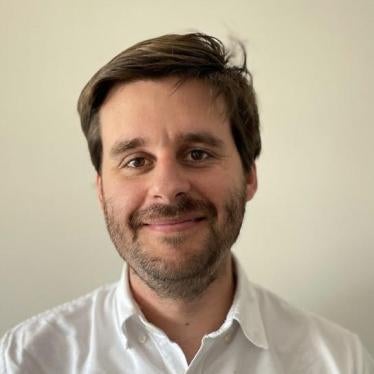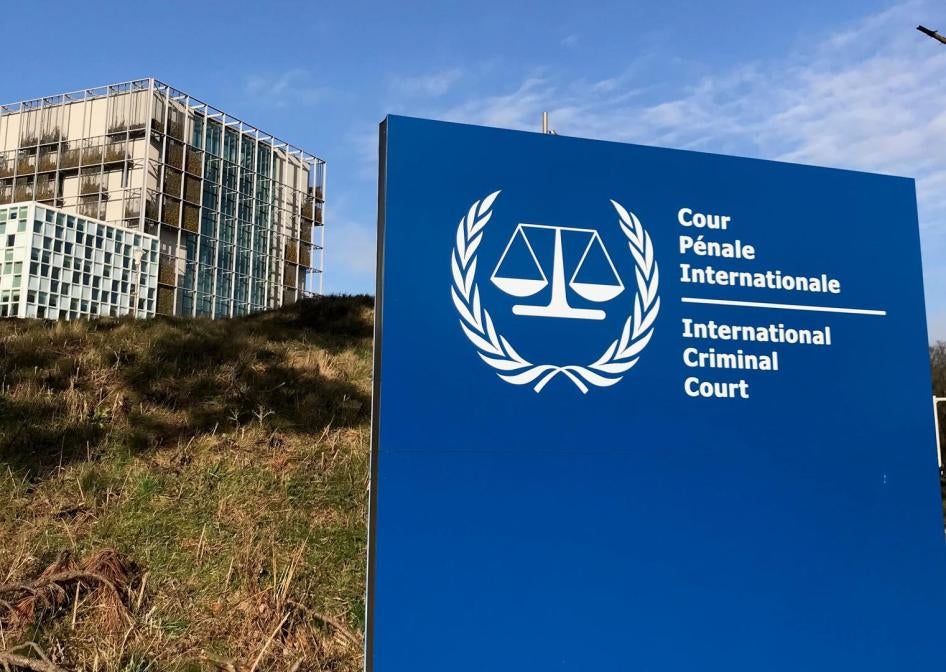On October 28, the International Criminal Court (ICC) prosecutor, Karim Khan, on a visit to Bogota, announced that his office is closing down its preliminary examination in the country. The decision was cast as heralding a new chapter in the ICC’s support for national justice. But given the fragile transitional justice system in Colombia, the ICC’s decision to step back now raises concerns that it could undermine victims’ access to justice.
Colombia has endured over 50 years of armed conflict between government forces and non-state armed groups. Military personnel and other state agents, paramilitary groups, and guerrillas—notably the Revolutionary Armed Forces of Colombia (FARC) and the National Liberation Army (ELN)—have committed thousands of grave international crimes. In 2016, as part of their peace negotiations, the Colombian government and the FARC reached an Agreement on the Victims of the Conflict as part of their peace talks. Among other measures, the agreement provided for a “Special Jurisdiction for Peace” to investigate and prosecute international crimes and other human rights violations committed in the context of the armed conflict.
The ICC preliminary examination
The prosecutor’s preliminary examination aimed to determine whether or not a full ICC investigation was merited. There was no question that the crimes were serious enough to attract the court’s scrutiny. They included war crimes by armed groups and as many at 6,000 extrajudicial executions known as “false positives,” in which members of the military allegedly killed innocent people to boost their body count during the years of fighting.
But the ICC is a court of last resort, deferring to genuine national proceedings. Colombian authorities have undertaken a range of domestic initiatives over the years for accountability. As a result, the ICC prosecutor’s office for several years had been monitoring national proceedings to determine whether it needed to step in.
Most recently, the government established the Special Jurisdiction for Peace, in charge of handling “grave violations of human rights and international human rights law.” The special jurisdiction, set up under a constitutional amendment, has a mandate over atrocities committed by FARC guerrillas and members of the Colombian armed forces, amongst others.
Proceedings before the Special Jurisdiction for Peace
Proceedings before the Special Jurisdiction for Peace, set up in 2017, remain at an early stage. The critical issue of detailing the punishment, known as “special sanctions,” that will be imposed by the tribunal, if and when people accept responsibility and are convicted, remains unaddressed. To be sure, there have been landmark steps forward in the past year such as Special Jurisdiction charges against 26 individuals, including a former general and several colonels, for “false positive” killings and against eight former senior FARC commanders for hostage taking and connected crimes.
But judicial authorities have made little significant progress regarding other crimes previously covered under the ICC’s preliminary examination, including sexual and gender-based crimes and offenses relating to the promotion and expansion of paramilitary groups.
Critically, the transitional justice system remains fragile. Former President Álvaro Uribe, a mentor of the current president, Iván Duque, and governing party leader, has recently proposed an “amnesty” and something “almost like a clean slate.” Uribe later proposed reforming the Special Jurisdiction and reducing prison sentences for members of the military.
These proposals are part of a pattern of efforts by the governing party, the Democratic Center, to undermine progress at the Special Jurisdiction, including by vetoing legislation that is critical for its operation, proposing reforms to seemingly undermine the work of the justice system, and making statements that appear designed to smear or intimidate the Special Jurisdiction and undermine the legitimacy of its decisions.
The Office of the Prosecutor’s changed approach
Against this complex backdrop, the former ICC prosecutor, Fatou Bensouda, whose nine-year term was completed in June and who had inherited the examination from her predecessor, had initiated a consultation process. The aim of the process was to develop benchmarks that would allow the Office of the Prosecutor to determine whether to close the preliminary examination and defer to national proceedings, or open ICC investigations in the absence of national justice.
Instead of proceeding with this framework, Khan’s decision to close now was accompanied by a cooperation agreement signed by Khan and President Duque aimed at safeguarding the progress made under the Special Jurisdiction. If the Colombian government violates the agreement, it could lead the ICC prosecutor to reconsider the decision to close the preliminary examination and to seek to open an investigation.
The agreement with Colombia was concluded with little to no genuine consultation with civil society organizations and victims’ associations, although some have welcomed the prosecutor’s decision to close the preliminary examination. By the time Khan met with civil society groups and victims’ representatives in Bogotá, his decision to close the preliminary examination with a cooperation agreement had already been leaked to the press and made public.
The cooperation agreement
The agreement itself — seven short articles — lacks the teeth a benchmarking approach might have offered. The key provisions are in articles 1 and 6.
Article 1 requires the Colombian government “without prejudice to the separation of powers” to allow the Special Jurisdiction for Peace, as well as the ordinary courts and an earlier transitional justice process provided for through the Justice and Peace Law, to proceed without interference and to provide adequate financial resources to the courts and security for all participants in these processes. It also requires the government to promote cooperation between the ordinary justice system and the Special Jurisdiction.
Article 6 provides that the prosecutor may reopen the preliminary examination should the government undertake:
“measures that might significantly hamper the progress and/or genuineness of relevant proceedings and the enforcement of effective and proportionate penal sanctions of a retributive and restorative nature; initiatives resulting in major obstructions to the mandate and/or proper functioning of relevant jurisdictions; or any suspension or revision of the judicial scheme set forth in the peace agreement in a manner that might delay or obstruct the conduct of genuine national proceedings.”
The agreement restates, on the one hand, the Colombian government’s constitutional and international obligations, and, on the other hand, the tests applicable to determining when the ICC has jurisdiction.
It is unclear whether the risk of re-opening the preliminary examination will suffice to ensure Colombia’s meaningful cooperation. The Office of the Prosecutor has acknowledged that at certain points it was clear that Colombia authorities were doing nothing more than the minimum to “keep the ICC at bay,” not to advance justice. This seems even more likely to occur in the absence of a preliminary examination.
Article 2 of the agreement provides that the government “will continue to keep the Office of the Prosecutor informed of the progress of the investigations and prosecutions” and “facilitate access to relevant records and documentation…. subject to the requirements of Colombian law and the Rome Statute.” But in the past Colombian authorities failed to provide information to the OTP, arguing that they do not have a duty to share any information with the OTP prior to an investigation and that the information was confidential under Colombian law.
Limiting the Office of the Prosecutor’s leverage
By stepping back without requiring more from the Colombian government, the ICC prosecutor risks failing to make the most of its investment in the country. That investment has yielded some positive developments for justice. The ICC succeeded in catalyzing positive steps in Colombia, particularly in countering legislative proposals that could set back accountability efforts. These include attempts to undermine progress by the Special Jurisdiction. We believe the office could have done more to have greater effect in prompting prosecutions in the country’s ordinary jurisdiction, particularly against high-level officers involved in “false positive” killings.
Our research suggests that the ICC’s influence is likely to be the most constructive where authorities are concerned that it could open an investigation if there isn’t sufficient progress nationally. While that influence has been taxed by the protracted nature of the preliminary examination in Colombia, recent steps — like the office’s identification of potential cases and submissions to the Constitutional Court — have demonstrated a more active approach. Closure now removes one important factor that, on a complex and multi-layered landscape, has resulted in forward, if incremental and inconsistent, movement on accountability through Colombian mechanisms.
It’s true that some ICC states parties have insisted in recent years on time limits for preliminary examinations. But concluding that Colombia’s preliminary examination has been too long because it has lasted 17 years is an oversimplification. Unlike some other preliminary examinations, the examination in Colombia covered a wide range of international crimes occurring in different periods, often in a complex environment for accountability.
Indeed, the examination was originally focused on abuses by armed groups and their allies in government. The army’s “false positive” killings — one of the priorities of the preliminary examination in recent years — took place well after the examination began. And the 2012-2016 peace process generated a difficult terrain for the ICC, narrowing opportunities for a more confrontational approach lest it be viewed as spoiling the peace. Simply put, Colombia’s preliminary examination has been one and many.
Insisting on strict limits for preliminary examinations is also short-sighted. The ICC prosecutor can have a powerful role to play in some situations to catalyze national justice. This will not be applicable in all situations and should not distract from the primary purpose of an examination, that is, to determine if the ICC prosecutor should act to open an investigation.
But in some situations, ongoing robust engagement by the office can stimulate national action. This, and not the length of the preliminary examinations, is a better proxy for their effectiveness and is key to hopes for the court’s broad impact. Pressure to conclude the ICC’s engagement prematurely when it comes to preliminary examinations misses the fundamental nature of the ICC’s Rome Statute founding treaty, as creating a system for justice, and not simply a courtroom in The Hague.
It remains to be seen whether the ICC prosecutor’s refashioning of the office’s role in Colombia will continue to advance prospects for victims in Colombia to have their day in court.









